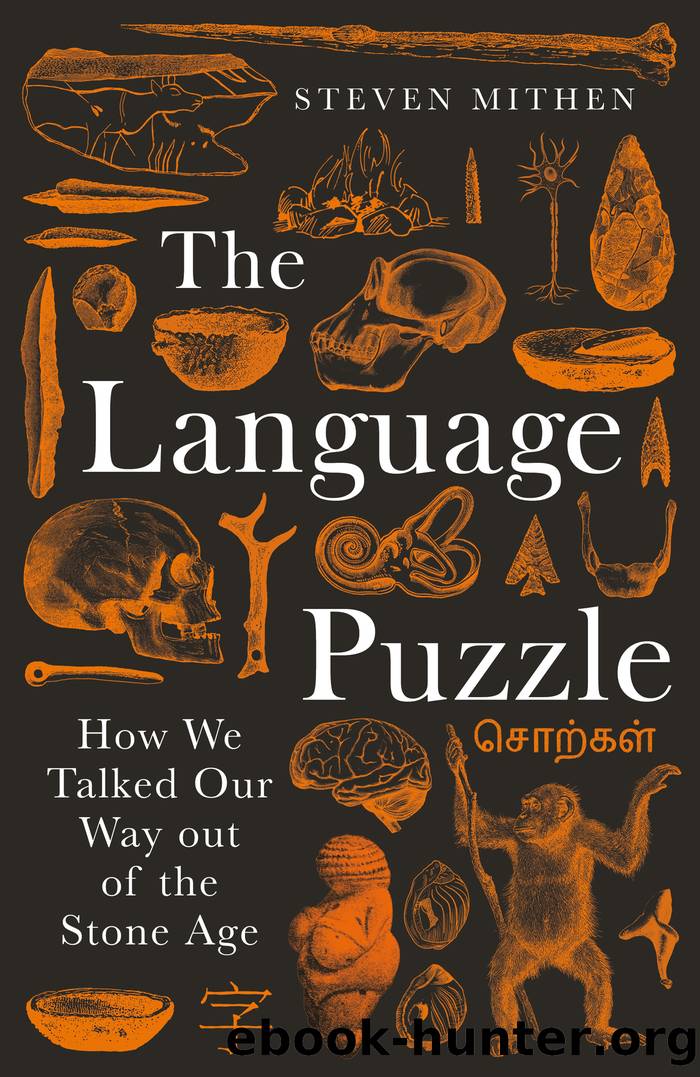The Language Puzzle by Steven Mithen

Author:Steven Mithen [Mithen, Steven]
Language: eng
Format: epub
Publisher: Profile Books
Published: 2024-02-14T20:00:00+00:00
Sound shifts from becoming lazy
If upspeak is a recent development, sound change must have been occurring ever since words were first spoken. Its recognition came in the early nineteenth century by noting that the emergence of Germanic from Proto-Indo-European (PIE) involved changes in the initial consonants of many words. Because PIE is no longer spoken, its words are reconstructed by examining cognate words in its daughter languages, including German, Danish and English (from the Germanic branch), and French, Italian and Spanish (from the Romance branch that emerged via Latin). Reconstructing the PIE words is done by taking the most common form of the word in the surviving languages.36
This process of reconstruction identified that a widespread change had occurred in the shift from PIE to Germanic: the consonants at the start of words had changed. Several plosives were weakened to become fricatives: /p/ had become /f/, /t/ had become /θ/ = th, and /k/ had become /tÊ/ = ch. Moreover, several voiced consonants became unvoiced: /g/ had become /k/, /d/ had become /t/ and /b/ had become /p/. For instance, *pods became *fot in Germanic, which is now foot in English, while *grno became *kurn, with corn as the modern English equivalent. Because this sound change did not happen in Latin and the later Romance languages, English has systematic differences from French, Italian and Spanish. For instance, words spelt with an âfâ in English are frequently cognate to those spelt with a âpâ in French and Italian, such as father (père and padre), fish (poisson and pesce) and few (peu and poco).37
Why this sound shift occurred in the Germanic branch of Indo-European but not in the Romance languages remains unclear, as is precisely when it occurred â the best guess is around 500 BC. There is an explanation, however, for the cause of the change, one that we also noted when considering why words change their meaning: least effort.38 It takes more time and energy to momentarily close the mouth to make a plosive than to narrow the airway to form a fricative; similarly, more energy is expended to vibrate the vocal folds to make a voiced consonant than one that is unvoiced. The savings in time and energy might appear marginal, but when we are speaking 16,000 words a day, and up to 200 words a minute, the tiny savings soon accumulate.
Another way to save time and effort is to shorten or entirely skip the ends of words â what would be the point if one is confident that the listener has already grasped the meaning of the word being spoken? The past tense of English verbs is often formed by adding an -ed at their end, as in jumped, walked and bathed. In the sixteenth century, the -ed was fully pronounced as in jump-ed, whereas today we have lost the vowel and say jumpd, maintaining the final /d/ to indicate that the word is past tense. In other cases, this âsound erosionâ leaves the potential for confusion. French verbs are a good example.
Download
This site does not store any files on its server. We only index and link to content provided by other sites. Please contact the content providers to delete copyright contents if any and email us, we'll remove relevant links or contents immediately.
| Anthropology | Archaeology |
| Philosophy | Politics & Government |
| Social Sciences | Sociology |
| Women's Studies |
Mysteries by Colin Wilson(3438)
People of the Earth: An Introduction to World Prehistory by Dr. Brian Fagan & Nadia Durrani(2719)
Ancient Worlds by Michael Scott(2663)
Foreign Devils on the Silk Road: The Search for the Lost Treasures of Central Asia by Peter Hopkirk(2452)
The Splendid and the Vile by Erik Larson(2448)
The Memory Code by Lynne Kelly(2393)
Come, Tell Me How You Live by Mallowan Agatha Christie(2244)
The Earth Chronicles Handbook by Zecharia Sitchin(2215)
Lost Technologies of Ancient Egypt by Christopher Dunn(2210)
The Plantagenets by Dan Jones(2075)
Last Chance to See by Douglas Adams(1976)
The Return of the Gods by Erich von Daniken(1925)
Wars of the Anunnaki by Chris H. Hardy(1700)
Keeper of Genesis by Graham Hancock(1632)
Before the Dawn by Nicholas Wade(1596)
The Cygnus Mystery by Andrew Collins(1548)
The Message of the Sphinx by Graham Hancock(1498)
Fragile Lives by Stephen Westaby(1444)
A History of the World in 100 Objects by MacGregor Neil(1354)
